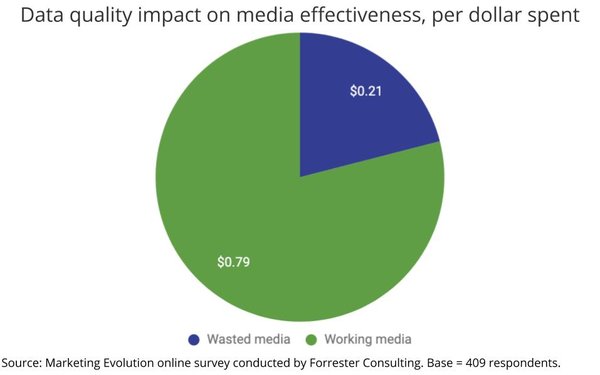
Marketers suffer from a variety of negative consequences stemming from poor-quality data that collectively drains
marketing resources and limits effectiveness. Wasted media spend is the most frequently cited repercussion.
Collectively, marketers estimate that 21 cents of every media dollar spent by their
organization in the last year was wasted due to poor data quality, which translates to a $1.2 million and $16.5 million average annual loss for mid-size and enterprise organizations, respectively,
according to the study.
The findings come from the report Why Marketers Can’t Ignore Data Quality,
commissioned and conducted by Forrester Consulting on behalf of Marketing Evolution. The goal was to evaluate the state of marketing and media data quality and strategies that help to promote
quality.
advertisement
advertisement
Marketers depend on high-quality data, but they struggle to acquire it.
Some 35% cited inaccurate targeting as the greatest hurdle, followed by 30% who cite lost customers;
29%, reduced productivity; 28%, poor customer experience; 24%, inaccurate marketing and media performance as the biggest challenges from poor data quality draining valuable resources.
The
report found that marketing teams spend as much as 32% of their time managing data quality, and on average, 26% of their campaigns in the last year were hurt by poor data quality.
Other
challenges include defining the term and maintaining consistent levels of “high quality” data, as well as managing mounting volumes and integration issues, and regulatory and privacy
concerns.
When asked to name the most important elements that lead to success in marketing performance, 65% of marketers cite high-quality data, followed by 52% who cite internal skills and
expertise; 50%, effective use of marketing dollars; 47%, vendor and partner expertise; 43%, executive support; and 44%, the ability to tap into a variety of data resources.
To improve data
quality, the research identifies several attributes that best define data quality: timeliness, completeness, consistency, relevance, transparency, and accuracy. Many say improving data quality also
improved customer experience, customer targeting, faster decision making, and less waste for media spend.